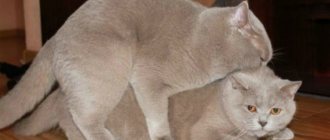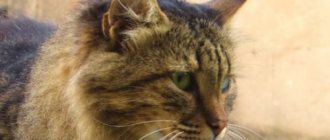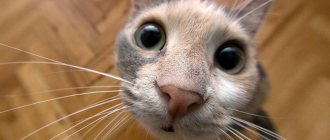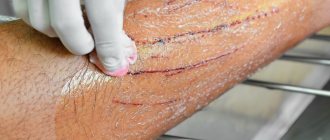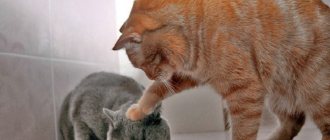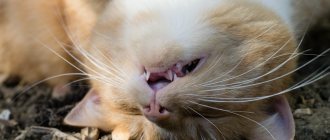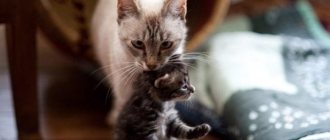4227Pavel
Even many years of living with a pet cannot guarantee a complete understanding of its behavior. So many owners wonder why cats rub against their legs? This phenomenon often manifests itself in relationships between humans and animals. In addition, the pet may rub against other objects in the house and even outside it. Therefore, some owners need an explanation for this behavior of their pets.
The animal world differs significantly from the human world in terms of transmitting information. For these purposes, individuals often use odors. In particular, an excellent sense of smell gives cats the ability to quickly determine the position of the prey. This skill is one of the means of survival in the wild. Pets use their sense of smell to find a home or their own young.
© shutterstock
In an apartment, the pet still considers it necessary to limit the limits of its territory. This is the root cause of a cat rubbing against people or furniture, for example. There are special zones on the animal’s body that secrete a special secretion. Most of them are concentrated :
- on the muzzle;
- on the paws;
- around the anus.
It is especially noteworthy when a cat rubs its muzzle against its owner's face. After all, a huge amount of secretion is located in the forehead area. During such a ritual, the animal may purr and look extremely happy. This indicates that the process gives him satisfaction and brings peace. This reaction is associated with the original cause of this phenomenon: the cat feels safe in its territory.
By the way, this instinct is not only associated with creating boundaries. The fact is that cats live in families, and by smell they can determine whether they belong to a pride. Owners of two or more pets may notice that they are rubbing against the same object or corner. This is due to the fact that they belong to the same clan.
The importance of smells in the cat community
In the animal world, far from human understanding, having a sensitive sense of smell plays an important role for survival. Much more effective than sight and hearing, the sense of smell helps to sense the approach of prey, a competitor or a sexual partner.
With the help of smells, cats transmit information to each other about the belonging of an individual to a pride, items of personal property, as well as the boundaries of the territory. A secret with an individual smell for each individual helps to mark these boundaries.
The glands that produce a special substance are located in three places:
- Animal muzzle.
- Areas between the pads on the paws.
- Under the tail - at the anus.
Thus, when the cat begins to rub against parts of the owner’s body, he somehow leaves his scent. The same applies to its relatives, as well as various inanimate objects, including the corners of sofas and walls. This behavior means that the pet is marking its property, protecting it from attacks.
How to stop a cat from rubbing against your legs
Pleasant moments
If pets rub against something, then, as a rule, this does not cause negativity in a person. But there are exceptions.
There are people who don't like this behavior. And they are not ready to put up with violation of personal space. If the owner does not want to let the cat too close into his life, then it is worth weaning him from this habit.
- It's worth taking a step back whenever the cat tries to do this.
- The cat should not be rewarded for this process. Pet or give a treat.
Reasons for behavior
The cat ritual of wiping is somewhat similar to flirting. The pet presses its head against the owner's leg, then rubs its side, and as a finishing touch wraps its tail around the human limb. The animal performs the same manipulations with the hands of its owner, and sometimes pokes its muzzle in the face. This behavior has both an instinctive biological and social nature, which developed in the process of adaptation to home conditions.
To better understand cats, it is worth finding out why they continue to perform this ritual. Known reasons include:
- Marks. Just like personal belongings, toys, territory, for a cat a person is his personal property, a member of the family. When the owner is absent for a long time, his sign of belonging to the pride disappears. Purr senses this and begins to rub, correcting the misunderstanding.
- Collects information. This most often happens when guests come to the house. When coming into contact with someone new, the pet scouts the situation for a potential threat. In addition, by leaving its scent on guests, the animal adapts to their presence.
- Communicates with relatives. Domestic cats also have their own post office, and the postman is the owner of it. If a pet runs up to its human with a fit of tenderness, do not delude yourself. Perhaps the striped neighbor on the floor below conveyed very important news.
- Requires affection. In this case, a conditioned reflex is superimposed on the instinctive basis. It is produced by a kitten when it, marking a large and warm person with its scent, receives affection. As a result, the association is reinforced, and the animal begins to rub when it wants attention.
- He wants to eat. Here, rubbing is also associated with receiving pleasure after the ritual. However, it is not the only sign that the animal is asking to be fed. This is usually accompanied by meowing and a characteristic hungry look.
- Walking. During the period of sexual heat, females leave pheromones on their owners - messages for potential sexual partners. This is especially true for cats that do not go outside.
Interestingly, similar behavior can also occur among street animals. Often cats, on whose territory a person has set foot, thus declare their rights to him and show condescension.
Possible negative consequences
You should not scream or hit him if he rubs against furniture and interior items, clothes or legs. At this moment the pet experiences a feeling of calm and this is important for him in the place where he lives.
Favorite pet
But sometimes animals are so overwhelmed with feelings and pleasant sensations that they drool. In this case, wherever the pet has been there will be wet marks or dried stains. This always especially affects the owner’s personal belongings, which are the most pleasant for the furry tenant.
Such excessive love and activity can negatively affect the general condition of the cat. Therefore, you should not calmly ignore these cat urges. In this case, you should follow certain rules:
- The main thing is not to treat with your own methods and not to overload with medications. You need to consult a veterinary clinic;
- watch the cat. It is important to understand how he feels when he rubs with saliva;
- Buy a special product at the pet store for spraying in the apartment. They typically contain calming ingredients and scents from other animals;
- If your cat is very weak, in a bad mood, has problems with shortness of breath, or has an extremely rapid heartbeat, you should urgently consult a doctor.
You shouldn’t panic every time your cat wipes himself; as a rule, this is a common thing for him and a completely normal reaction. There is no reason to wean him from this activity. These are natural instincts. It’s better to just be happy and cheer yourself up by playing along with him.
Eyes
A cat's eyes are a mirror of her emotions. If your pet is looking straight ahead with wide eyes, it means that he is very interested in what is happening. With blinking and flickering eyes, the cat expresses its devotion. Half-closed eyes indicate sleepiness or remaining cautious. A clouded gaze signifies complete calm and relaxation and is a signal of trust and friendship.
123RF/Stefano Venturi
If a cat's pupils suddenly widen and her gaze becomes “crazy,” this indicates that she is very scared. Slit pupils mean that the cat is alert and confident. Staring at someone point-blank is a challenge, and at such moments it is better to keep your distance.
Marks
scent glands on the cheeks, forehead, near the ears, chin and at the base of the tail.
, so when she rubs against a person or “butts” him, she is simply marking him. Kittens usually learn this behavior from their mothers.
Cats have a highly developed sense of smell, which they rely on to receive a significant amount of information about the world around them. In order to distinguish familiar people/animals/objects from unfamiliar ones, she needs to put the “I was here” or “I know him” mark on them. She wants to live among familiar smells
to feel confident and safe. At home, cats most often rub against corners, because instinct tells them that it is at the corner, that is, at the intersection of at least two passages, that there is a greater chance of meeting another animal and showing it that someone was here before it.
Interesting
, that if a person comes home to his cat from guests, where their cat rubbed against him, his own cat will try to “re-mark” these marks and therefore will rub with redoubled force. Moreover, cats are more prone to this than cats.
Over time, the marks evaporate, so cats have to regularly rub their faces on people's legs and on all suitable objects in the house.
Sounds
The more we communicate with our pets, the more they communicate with us. Cats are very receptive and capable of learning by imitating the object that interests her. Perhaps that is why the intonations of the sounds they make are very similar to human speech: it can be affectionate, questioning, or demanding purring.
Every cat knows how to get exactly what it wants from a person using sounds of different intonations.
For example, a cat asks for feeding in a drawn-out and long tone at low frequencies, and if she wants the owner to give her attention and care, the cat makes short sounds simultaneously at low and high frequencies, which have a beneficial effect on a person’s mood.
123RF/Nikita Melnikov
By meowing, small pets try to attract attention to themselves, adapt this sound to each situation and express their desires. Some of them “tell” when they go to the toilet or simply enter the room.
There are also unpleasant, frightening sounds in a cat's arsenal, such as hissing or snorting. In this way, animals express their displeasure or defend themselves. During fights, cats can make completely unimaginable sounds - screams, screams and growls. But if a cat is cornered and cannot escape, it makes a strange sound in its throat (howl). This suggests that, despite the fright, she has not yet completely lost her aggressiveness and can go on the attack.
Sometimes cats make a rather strange, quiet "clack" sound when they are prowling for prey or when they see a bird outside the window. This sound is used by mother cats to draw the attention of kittens to potential prey.
There is also a silent meow, when a cat opens its mouth but does not make any sound. In fact, sound is still produced, but our ear does not perceive it.
The characteristic purring sound of a cat is produced by the vibration of two folds of the mucous membrane located in the lower part of the larynx. It is commonly thought that this is a sign that the cat is happy, but this is not always so clear. Rumbling consists of several sounds that vary in frequency and intensity, allowing a cat to express a wide range of feelings. The “rougher” the purr, the more distinct the sounds become in each beat, which means that the cat’s pleasure has reached its maximum level. When a cat becomes bored or begins to doze off, the purring softens and it becomes more difficult to distinguish its beats.
Why do cats expose their bellies to be petted?
This behavior looks like an invitation to pet her, but this is not always the case!
When a cat greets “its” person, he expresses great trust by exposing his stomach. Many cats really enjoy having their bellies scratched. However, a similar friendly posture can often be observed when one cat attracts another to play. This may also be an invitation to a person to play. Even when a cat exposes its belly to a person, expressing trust, any physical contact can be perceived as a threat. In both cases, the temptation to touch the cat carries the risk of injury.
Is there any harm?
Cats that rub their noses on people do not cause harm to health, but they often leave traces of saliva. If the owners do not like to constantly wash their clothes, this behavior will cause discomfort. Copious secretion of saliva, which fills the mouth in a few seconds, indicates overexcitation of the animal’s central nervous system. It is recommended to show the cat to a veterinarian if the cat first rubs against its legs, smearing its pant legs with saliva, and then lies down on the floor and falls asleep. Sleep is usually restless, and the animal constantly twitches its paw. Due to overwork, cats become apathetic, coordination is impaired, heart rate increases, and breathing becomes difficult.
To relieve negative symptoms, veterinarians prescribe pheromones, which can be purchased from pet stores. When a cat sniffs the products sprayed indoors, it calms down. For severe neurological disorders, the use of feline sedative medications is indicated. To accurately identify diseases, it is necessary to take a urine and blood test.
